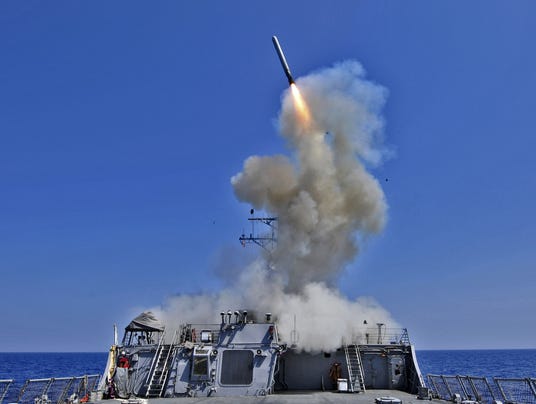Just had to share this new metaphor:
A second senior official, who has seen the most recent planning, offered this metaphor to describe such a strike: If Assad is eating Cheerios, we're going to take away his spoon and give him a fork. Will that degrade his ability to eat Cheerios? Yes. Will it deter him? Maybe. But he'll still be able to eat Cheerios.
Strike to degrade Syrian forces would still be limited
Tom Vanden Brook, USA TODAY7:06 a.m. EDT September 8, 2013
The attack would involve launches of missiles solely from ships, according to the two senior officers familiar with the planning.

(Photo: Jonathan Sunderman, AP)
STORY HIGHLIGHTS
- Mission compared to making Assad eat cereal with a fork instead of a spoon
- No Air Force assets included in the mission planning
- "Degrading" Syria's military is a term of art, not a science
WASHINGTON — Defense Secretary Chuck Hagel's choice of the term "degrade" to describe an attack on Syria has been interpreted by Pentagon planners as guidance for a limited strike, according to senior military officials.
The weapon of choice is the Tomahawk cruise missile aboard four Navy destroyers in the eastern Mediterranean. Though powerful, the missiles alone would likely not be capable of crippling Bashar Assad's regime, which is accused of using chemical weapons. The targets selected for attack are meant to punish Assad, not swing the tide in favor of rebels seeking his ouster, said a senior officer familiar with the planning.
That officer, another officer with experience in the Middle East and two senior defense officials with knowledge of the planning told USA TODAY the type of weapons that would be used and the type of targets that would be hit. All spoke on condition of anonymity because they were not authorized to speak publicly about the planning.
The attack would involve launches of missiles solely from ships, according to the two senior officers familiar with the planning. The Air Force can fire missiles from outside Syrian air space but are not expected to take part in the mission, the officers said.
"Degrade" is not a military textbook term, the four officers and officials said. In other words, it is open to interpretation.
Pentagon press secretary George Little said repeatedly in a briefing Thursday that an attack on Syria would not require U.S. ground troops, or "boots on the ground." The mission would be limited to deterring and degrading Assad's ability to use chemical weapons.
The strike would be limited in scope and duration, Little said. The security of chemical weapons stockpiles is being taken into account by the Pentagon.
The strike, as envisioned, would be limited in the number of targets and done within a day or two. It could be completed in one fell swoop with missiles, said one senior official familiar with the weapons involved. A smaller, follow-on strike could be launched if targets aren't sufficiently damaged.
(Continued at the link below)
No comments:
Post a Comment